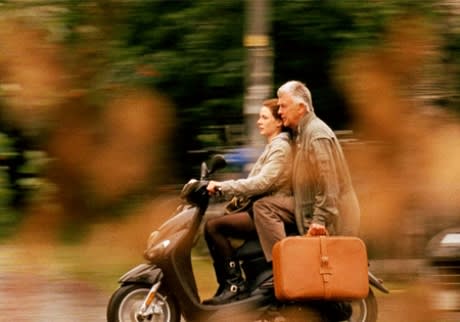Slightly more interesting than the film itself is the way that Richard Hobert's standard road-trip comedy-drama, A One-Way to Antibes, portrays family. Where the cinematic status quo has long since established the preciousness and importance of the familial bond, traditionally finding resolution in the unshakable bonds that stem from a long-brewing conflict, this hyper-realized, somewhat cartoonish, Swedish nostalgia trip suggests that it's actually an imposing and limiting force.
Septuagenarian George (Sven-Bertil Taube) spends most of his days indoors, waiting for visits from his young housecleaner Maria (Rebecca Ferguson), who is routinely stealing objects from his house, relying on his deteriorating vision to mask her misdeeds. Indifferent to her actions—more concerned with being left alone—George is forced to play his hand when he learns of her involvement in a conspiracy with his children—Johan (Dan Ekborg) and Susanne (Malin Morgan)—to sell his house and ship him off to a retirement home.
Presumably, this dispute would result in George confronting his children and discovering a connection, thus living happily ever after. But very little screen time is spent with these characters actively engaging each other. Most of the story unfolds with George blackmailing Maria into taking a road trip with him, evading and ruining his children's plans, and eventually revealing a secret mistress in the titular Antibes that he would have married if his wife hadn't become pregnant with Johan.
In between this superficial handling of mortality as a forced method of introspection and acknowledgement of past regrets—three of his deceased regrets follow him around for most of the movie in ghost form--Antibes acts out an abundance of comic road trip clichés with George smoking pot, speaking at a funeral and being treated by a veterinarian when his heart almost gives out. While serviceable in its own formulaic, banal sensibilities, it's all quite standard for the genre.
In fact, the only thing surprising about this film is that no characters actually grow from beginning to end. George's children and his housekeeper all remain stationary—although, Susanne takes off her make-up at the end, suggesting some form of self-awareness—in ideology, leaving only our protagonists' physical trip and acknowledgement of past screw-ups to drive the narrative. And since his revelation has to do with realizing that his relationship with his children is irreparable—presumably because of his compounding resentment of their existence—we're left only with the glib assertion that it's never too late to fulfill your dreams.
A One-Way to Antibes screens on Sunday, November 25th at 8:30pm at the Royal.
(Filmpool Nord)Septuagenarian George (Sven-Bertil Taube) spends most of his days indoors, waiting for visits from his young housecleaner Maria (Rebecca Ferguson), who is routinely stealing objects from his house, relying on his deteriorating vision to mask her misdeeds. Indifferent to her actions—more concerned with being left alone—George is forced to play his hand when he learns of her involvement in a conspiracy with his children—Johan (Dan Ekborg) and Susanne (Malin Morgan)—to sell his house and ship him off to a retirement home.
Presumably, this dispute would result in George confronting his children and discovering a connection, thus living happily ever after. But very little screen time is spent with these characters actively engaging each other. Most of the story unfolds with George blackmailing Maria into taking a road trip with him, evading and ruining his children's plans, and eventually revealing a secret mistress in the titular Antibes that he would have married if his wife hadn't become pregnant with Johan.
In between this superficial handling of mortality as a forced method of introspection and acknowledgement of past regrets—three of his deceased regrets follow him around for most of the movie in ghost form--Antibes acts out an abundance of comic road trip clichés with George smoking pot, speaking at a funeral and being treated by a veterinarian when his heart almost gives out. While serviceable in its own formulaic, banal sensibilities, it's all quite standard for the genre.
In fact, the only thing surprising about this film is that no characters actually grow from beginning to end. George's children and his housekeeper all remain stationary—although, Susanne takes off her make-up at the end, suggesting some form of self-awareness—in ideology, leaving only our protagonists' physical trip and acknowledgement of past screw-ups to drive the narrative. And since his revelation has to do with realizing that his relationship with his children is irreparable—presumably because of his compounding resentment of their existence—we're left only with the glib assertion that it's never too late to fulfill your dreams.
A One-Way to Antibes screens on Sunday, November 25th at 8:30pm at the Royal.
